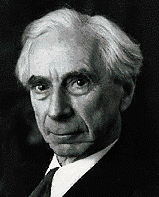It is alleged that Bertram Russell once said that if he went to heaven and met God and God asked Russell why he didn’t believe that He existed, Russell said he would reply, “Not enough evidence....just not enough evidence!”
Before addressing the issue directly, it is useful to get some sense of the conceptual contours and its history which have shaped the discussion of this philosophical objection.
First of all an important distinction can be made between belief 'that' God exists and belief 'in' God. The difference in the distinction is that in the latter one not only does she believe that God exists, she is also committed to Him. Further having made that distinction one can argue that while belief that God exists is a rational matter, whether one chooses to “believe in God,” that is be committed to Him, is not entirely a rational matter.
Second, in important and widely cited essay on the importance of having evidence for one’s beliefs was, “The Ethics of Belief” by W. K. Clifford. It is famous for the Cliffordian quote: "It is wrong always, everywhere, and for anyone, to believe anything upon insufficient evidence."
His assertion and supporting arguments amounts to that we should hold no beliefs without sufficient evidence--a difficult assignment given the number of beliefs we hold and our radical existential dependence on authority for some of our beliefs. For example, do we run all the experiments that scientists report on before we believe? Are we irrational to not do so? Do we (or can we even) properly test our sensory and cognitive faculties for reliability in belief formation without first holding that they are reliable to run the tests? So it seems that Clifford’s maxim is in some important way defective—this is called the epistemic circularity problem.
There is also David Hume’s maxim that we should hold (all of) our beliefs according to the weight of evidence supporting them. But surely there might be exceptions to this. Without decrying the maxim as a good rule of thumb, should it be applied in every case?What about the person who is swimming for shore but making little progress against the undertow? Should she stop and calculate carefully the weight of evidence for her reaching the shore or should she form the belief she can make it and swim like crazy to make it? And if this is an exception, may there be others? Some of the philosophers I will refer you to will argue for the affirmative on that.
And we must not forget William James’ contribution to this discussion in his book, The Will to Believe. In a rough and ready way, his argument is that when confronted with a belief that is a forced, yet a live option and where the evidence for and against the belief is roughly even, it is rationally permissible in those existential situations to exercise one’s “will to believe.” But one should ask, isn't this the sort of situation that some theists find themselves? You could call this an existentialist response to the evidential problem.
 Theists who demur from these kinds of strategy tend to argue in two ways. One, is to argue that some sort of natural theology provides a strong case for rational belief in God. Another, is to hold that belief in God (belief that He exists) is 'properly basic' and need not be inferred from other beliefs we know are true. After all, they argue some beliefs must be like this, why not belief that God exists?
Theists who demur from these kinds of strategy tend to argue in two ways. One, is to argue that some sort of natural theology provides a strong case for rational belief in God. Another, is to hold that belief in God (belief that He exists) is 'properly basic' and need not be inferred from other beliefs we know are true. After all, they argue some beliefs must be like this, why not belief that God exists?
To answer the question we must explore both ways of answering this question....or so I assert. Let me begin by saying some things about both:
Natural theology can be construed in more than one way. For instance, it can be seen as an attempted direct answer to the challenge to provide evidence for the existence of God. It can also be seen as an attempt to provide phenomenal (appearances) evidence for a metaphysical position (reality).
As such, in this latter case, it has come under severe criticism from philosophers dating back at least to Immanuel Kant. Kant’s criticism of these sort of arguments is not regarding their persuasiveness, but rather, to call into question whether the categories by which we speak of appearances apply to the categories of things in themselves. In short, how can we compare our ‘world’ of appearances to the world as it is if we are unsure as to whether we have access to the world as it is? Of course, there are many other issues that have been raised about natural theology’s efficacy to support theistic belief, but at a minimum one could say that natural theology is in the same epistemic boat as any argument from appearances to reality. But that would include arguments from the appearances of physical objects to metaphysical naturalism or a metaphysical physicalism position!
That is to say that arguments like those employed by the natural theologian that begin from appearances and lead to the metaphysical belief that God exists are in the same epistemic boat as common sense arguments which begin from appearances of the nature of the external world and lead to the metaphysical belief that the external world is for the most part a close approximation (verisimilitude) to what they perceive it to be. Surely in both cases the arguments would be subject to Kant’s objection of arguing from appearances to reality, but is it irrational to believe the external world is for the most part what we perceive it to be? It seems that it is not irrational, but if this is not irrational, wouldn’t theism be in the same epistemic situation? By the way, Alvin Plantinga has argued something similar to this, but much more elegantly in his 1967 book, God and Other Minds.
So the upshot of this is that the evidence for God’s existence that comes from natural theology if not overstated, could provide some significant support for the belief that God exists. If that’s the direction you favor, you should scroll up this page and click on the “Natural Theology” tab to explore ways you might make your case. There is little doubt that these sorts of arguments have convinced sophisticated non-believers to become theists and if you don’t overstate your case, this line of argument may be the way to go.
On the other hand, you may want to opt for another way to justify your belief that God exists. This second way argues (roughly) that arguments have to stop somewhere and belief that God exists is one of those ‘properly’ basic beliefs.
God exists is one of those ‘properly’ basic beliefs.
To put it another way, belief that God exists is relevantly similar to other properly basic beliefs we hold rationally. That is, they are rational to hold in certain grounding situations, without having their justification limited to only non-circular argumentation. If your intuitions about this fork in the apologetic road lead in this direction, scroll up the page. Then click “Non-Inferential Justification” tab and check out the resources for that. Of course, feel free to check out both options!
Note this subject is reentertained in the second section of “Conceptual Apologetics,” so these ideas will be revisted again almost immediately following completing Section 1 and entering Section 2.